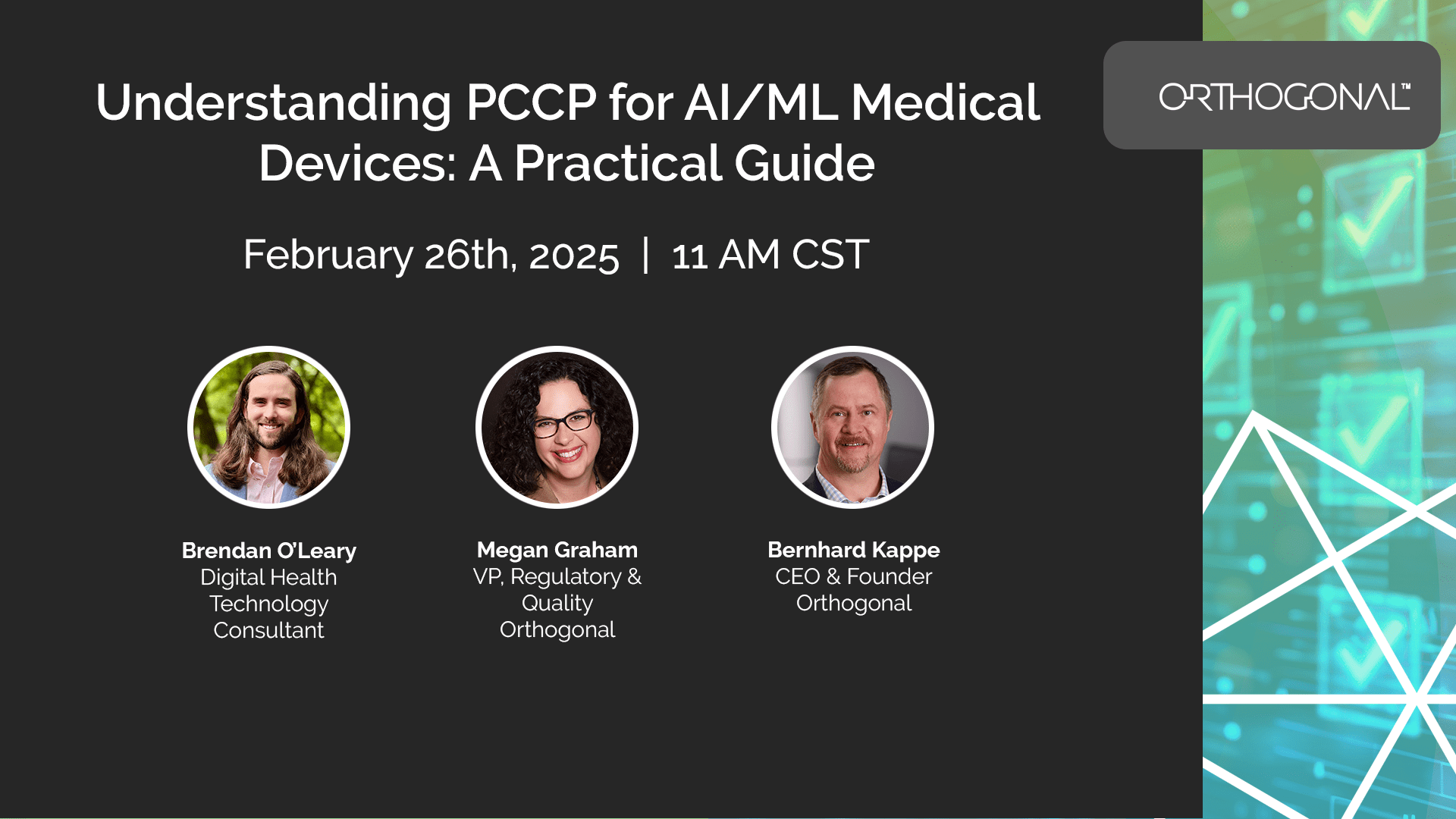
Talk
Leveraging Automation to Deliver High-Quality MedTech Software

The world of AI/ML-enabled medical devices is evolving rapidly, but regulatory processes often lag behind innovation. Updating an AI model in a medical device shouldn’t mean enduring a long, costly resubmission process. The FDA’s Predetermined Change Control Plans (PCCP) provide a structured way for companies to make pre-approved, controlled updates to their AI/ML software without undergoing full regulatory resubmission each time.
Orthogonal’s recent webinar, “Understanding PCCP for AI/ML Medical Devices: A Practical Guide,” explored the essentials of PCCP, how companies can leverage it to accelerate time-to-market, and what regulatory leaders need to know about compliance. Featuring insights from Brendan O’Leary, Digital Health Technology Consultant, and Megan Graham, VP of Regulatory & Quality at Orthogonal, the discussion was moderated by Bernhard Kappe, CEO & Founder of Orthogonal.
For professionals in regulatory affairs, quality assurance, or medical device development, understanding PCCP is essential to managing AI/ML updates efficiently while staying compliant.
A PCCP is a proactive regulatory strategy that allows medical device manufacturers to outline and pre-approve modifications to an AI/ML-based system. Instead of re-submitting an entirely new 510(k) or PMA every time an AI model is updated, companies can define:
By integrating PCCP into regulatory submissions, companies can streamline updates while ensuring continued compliance with FDA guidelines.
Traditional regulatory pathways are built around static medical devices, which makes sense for hardware but creates unnecessary friction for AI-driven systems that continuously improve over time. The FDA’s PCCP framework bridges the gap between regulatory rigor and AI adaptability, benefiting both manufacturers and patients.
By leveraging PCCP, companies can move beyond regulatory bottlenecks and focus on innovation, safety, and efficiency.
Implementing a PCCP isn’t just about checking boxes—it requires careful planning and collaboration between regulatory, quality, and engineering teams. The FDA expects PCCP submissions to include the following core components:
A PCCP must demonstrate how AI/ML updates will be tested and validated to ensure continued safety, effectiveness, and clinical relevance.
A well-structured PCCP should:
Companies that take a proactive approach to these components will reduce regulatory friction and speed up innovation cycles.
During the webinar, Brendan O’Leary and Megan Graham provided insights into how PCCP is already transforming AI/ML medical device regulation. Some key takeaways from real-world applications include:
These insights underscore the practical value of PCCP and its potential to reshape AI/ML medical device regulation.
While PCCP provides substantial benefits, companies must be prepared to address a few key challenges:
By addressing these considerations upfront, companies can maximize the benefits of PCCP while avoiding regulatory missteps.
PCCP isn’t just about regulatory compliance—it’s a strategic asset that can help MedTech companies stay ahead in the AI/ML space. Here’s why it matters:
PCCP removes barriers to deploying AI/ML updates, allowing companies to roll out improvements faster than competitors still relying on traditional regulatory pathways.
By eliminating the need for full resubmissions, PCCP significantly cuts regulatory expenses while maintaining safety and effectiveness.
AI/ML models thrive on continuous improvement. PCCP ensures companies can iterate without regulatory delays, keeping products at the cutting edge of medical technology.
For MedTech manufacturers working on AI-driven devices, embracing PCCP is a no-brainer. Those who integrate it effectively will be able to innovate faster, lower costs, and bring safer, smarter AI-enabled medical devices to market.
Ready to take advantage of PCCP? Here’s what to do next:
Identify AI-driven devices that could benefit from a PCCP strategy.
Work with regulatory, engineering, and quality teams to build a robust, FDA-aligned PCCP.
Proactive communication with regulators ensures smoother approval processes and avoids unnecessary roadblocks.
PCCP is evolving—staying informed will ensure ongoing compliance and continued competitive advantage.
By integrating PCCP into regulatory strategies, MedTech companies can move faster, innovate smarter, and maintain compliance with confidence.
PCCP represents a pivotal shift in AI/ML medical device regulation—one that allows companies to harness the full potential of AI without being hamstrung by slow, outdated regulatory pathways. As industry leaders embrace PCCP, those who act early will gain a distinct advantage in regulatory efficiency, product innovation, and market leadership.
If you’re in regulatory affairs, digital health, or medical device development, now is the time to explore how PCCP can transform your approach to AI/ML updates.
Brendan O’Leary, Digital Health Technology Consultant
Brendan O’Leary provides consulting services on digital health and medical device regulatory strategy to technology developers, healthcare organizations, trade and professional associations, and other stakeholders.
Brendan worked at the FDA for 14 years in a variety of roles, most recently as the founding Deputy Director of the Digital Health Center of Excellence and as its Acting Director throughout 2022. Brendan contributed to hundreds of precedent-setting decisions and co-authored dozens of policy documents that continue to provide the foundation for the FDA’s digital health efforts. He frequently represented the FDA on digital health and other topics through presentations at conferences and professional society meetings, press interviews, and interactions with Congress. Brendan also made significant contributions to the federal government’s response to SARS-CoV-2.
Megan Graham, VP or Regulatory & Quality, Orthogonal
Megan Graham is the Vice President of Regulatory and Quality at Orthogonal, bringing over 25 years of experience in software engineering and regulatory affairs. She has worked with leading organizations like Medtronic and Mayo Clinic, and founded her own digital health consulting practice in 2015. Megan’s expertise spans healthcare AI/ML, product development, risk management, and compliance strategies. As an adjunct professor at the University of Minnesota and active member of RAPS, HIMSS, and AAMI, she remains dedicated to advancing best practices in digital health.
Bernhard Kappe, CEO & Founder, Orthogonal
Bernhard Kappe is the Founder and CEO of Orthogonal. For over a decade, Bernhard has provided thought leadership and innovation in the fields of Software as a Medical Device (SaMD), Digital Therapeutics (DTx) and connected medical device systems. As a leader in the MedTech industry, Bernhard has a passion for launching successful medical device software that makes a difference for providers and patients, as well as helping companies deliver more from their innovation pipelines. He’s the author of the eBook Agile in an FDA Regulated Environment and a co-author of the AAMI Consensus Report on cloud computing for medical devices. Bernhard was the founder of the Chicago Product Management Association (ChiPMA) and the Chicago Lean Startup Challenge. He earned a Bachelor’s and Masters in Mathematics from the University of Pennsylvania, and a Bachelor’s of Science and Economics from the Wharton School of Business.
Related Posts

Talk
Leveraging Automation to Deliver High-Quality MedTech Software

Talk
The Playbook for Running a Multi-Partner Engineering Organization

Talk
Bridging the Gap: SaMD Strategy for Teams Built on Hardware

Talk
FDA/CDRH Changes: How MedTech Companies Can Prepare Webinar Summary